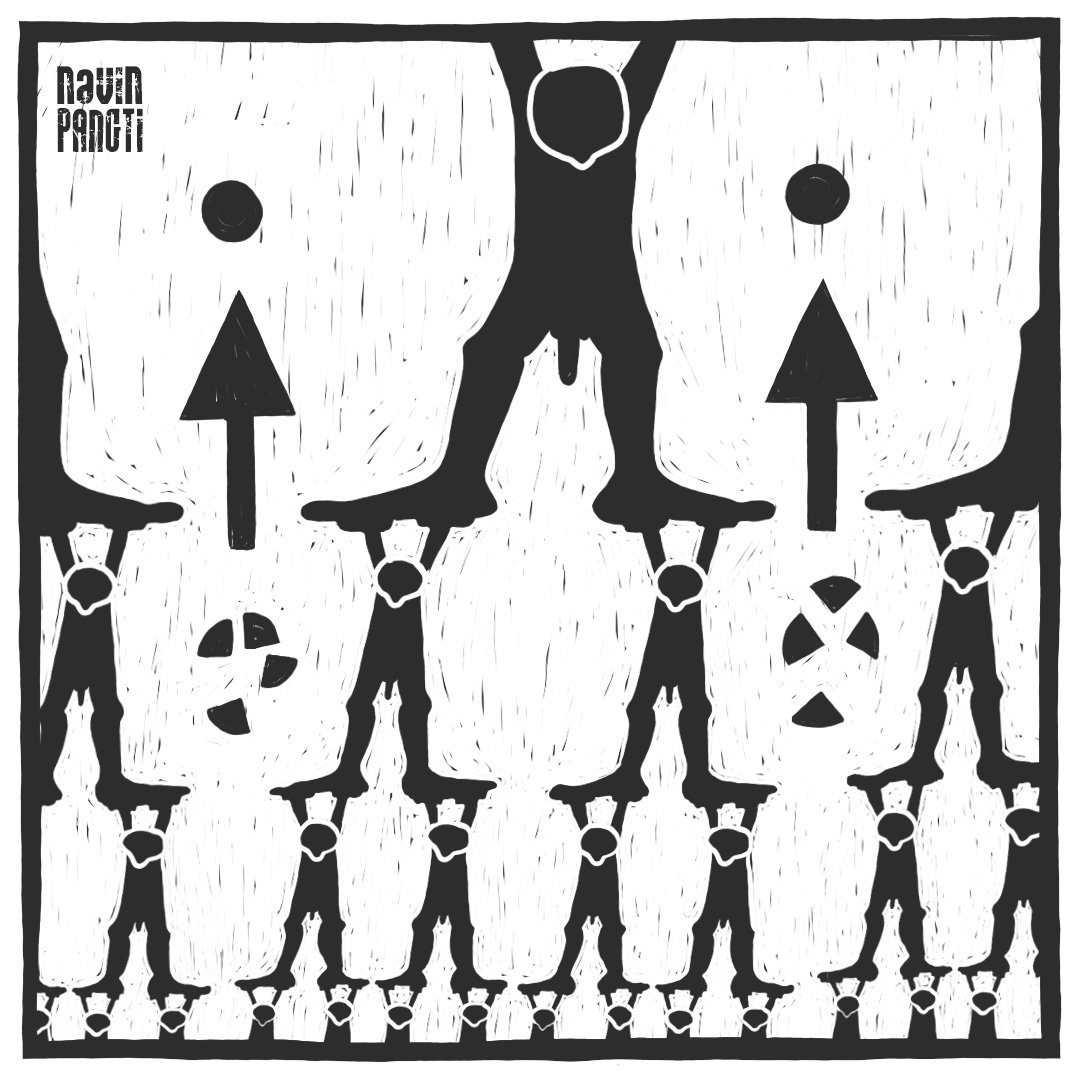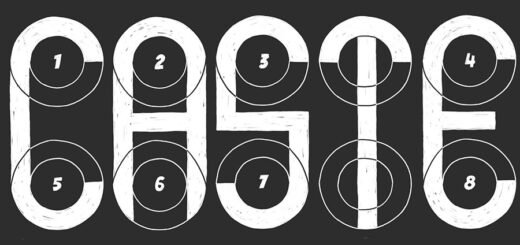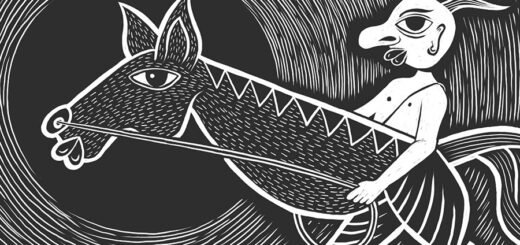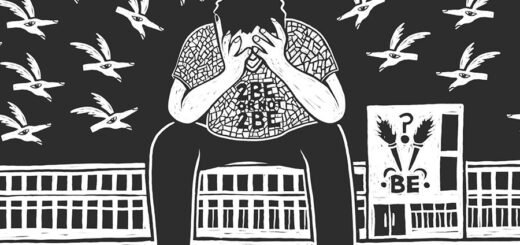System of Caste – A hierarchical worldview
We often blame the system for the evil we see around. We believe that the evil is imposed upon us. We seldom stop and ask ourselves – who imposed it? More often than not, we get what we deserve. Be it the government or a social hierarchy. They are nothing but a manifestation of our collective worldview.
Anyone who ‘belongs’ to the lower order of any hierarchy asks – What did I do to belong to here? Why am I subjected to humiliation when I did nothing to earn it? These are valid questions. Why should anyone suffer a repressive system which they did not help create? It is sheer luck that one lands up in a disadvantaged position by birth.
The answer to such queries lies in the frame of time through which we perceive and understand a social system. The social order that we experience today is not the cause but an outcome. And what we do today defines the future. As individuals, we assume ourselves to be the reference point. In order to understand the dynamics of caste, we will have to see ourselves as a traveler in the causal pathways that extend far beyond us. I firmly believe that this extra effort needed to fathom the current reality is what will actually contribute towards changing the future.

As stated earlier in other essays on the system of caste, it appears that systems like caste and patriarchy were not created by design. They got established because a certain section of the privileged classes wanted to ensure continuance of their privileges. The reference of these privileges in beliefs, actions, words, symbols, etc. served as reinforcements that ensured their continuance. Passing down through generations, they become supernatural voice – a divine dictum of sorts.
This need for continuance of privileges is propelled by the deep human desire to gain and sustain power with minimum effort. Frankly speaking, most of the societal ‘evils’ that we see around are nothing but manifestation of these desires. It is a basic animal instinct of sorts. That is why I wonder if fighting the caste system is going to be easy.
We may do everything within our means to eradicate the current system but a new system would evolve. Instead of caste, it could be class, or something else. The noun will change but the system will essentially prevail. A group of people will keep on believing that they are superior and will go all out to exert their superiority. This eternal ‘natural’ cycle can only be disrupted if the society as a whole evolves, philosophically. But that is not going to happen anytime soon!
Let us try to understand the hypothesis from a different perspective.
Do we wish for a world where everything is equal? Sadly no! We create differentials at the drop of a hat. That is our innate behaviour. We box and categorize everything and put them in hierarchical list. That is true for everything, even things like taste, smell, looks, size, texture, feelings, etc. As human, we seem to be wired to put things in lists and boxes. Pick up something as basic as aesthetics. What makes something beautiful? Isn’t beauty a perception largely defined by the majority, or those in power? Cultures, sub-cultures, and markets, define what is beautiful. We are mere pawns in this game.
The modern democratic systems claim that everyone is equal. Theoretically, everyone is indeed equal. But in reality this is far from true. There are numerous hierarchical setups embedded in this ‘equality’. Let us examine bureaucracy in India. It does not matter whether a person is sane or insane, bright or dullard, ethical or unethical… their being a bureaucrat makes them ‘superior’. Because of the so-called power they wield, people treat them as powerful people and they respond by exerting it through their words and actions. There are many sub hierarchies with this system. The administrative services folks are placed at a higher pedestal than the police service officers. Those recruited directly as civil services officers are kept at much higher pedestal than those promoted to senior posts. No matter how efficient a promoted officer is, the direct recruits always exert themselves – as individuals and as a group. The system never created these hierarchies. People did! Almost similar hierarchies exist in the professional world where even schools and colleges become factors that define one’s standing. It can often be as blatant as the bureaucratic landscape.
Another interesting example is that of the Indian healthcare industry. Ideally, every function has a unique role to play. But in reality, the specialists (doctors with a master’s degree) are regarded as the kings. General practitioners are treated as lesser mortals while para-medics, dieticians, technicians, etc. have hardly any say in the system. Within the doctor community, the allopathic practitioners literally dictate the healthcare space. These hierarchies not only breed inefficiency but also put immense pressure on an already fragile system. But we are okay with it. In fact, we love it. Our love ends up burdening the system even more.
Our cities too are divided along class lines. While one axis is that of rich and poor; other is that of educated and uneducated. Within educated, we have further categorization of professionals versus the rest. When property agents inform that a condominium is inhabited by ‘gentry’, they are building a class association to lure the customers. Even the per-square-foot rate of properties is defined by the inhabiting class.
Within these metropolitan condominiums, there are many which ensure ‘by rule’ that domestic help and other services providers do not use the main lift. Though a blatant display of class, we mutely accept it. What is even more interesting is that residents who belong to the so-called suppressed castes and talk aggressively against caste system too do not find this disturbing. They fail to realize that one class struggle cannot be different from other. Caste, after all, is a manifestation of class hierarchy of the yesteryears.
People often blame that members of a certain religious community live in ghettoes. We firmly hold on to this belief without realizing that almost each one does precisely the same. Choice of housing colony, location of city, choice of school for children, choice of market, choice of brands, patterns of consumption… everything is a manifestation of our class. While the metros have condominiums based on profession, buying capacity, etc., smaller cities have colonies based on language, region, caste, village, etc. Many a times these are not conscious choices. These cluster form automatically because as humans, we seek familiarity, which provides us a sense of belonging, safety and wellbeing. No wonder the issue of locals versus outsiders burns every nook and corner of the country. Be it a metropolis or a remote Himalayan village, the same story prevails – proving beyond doubt that we are hierarchy loving social animals.
There are many personal experiences that reinforce my belief that we are hierarchy loving animals. We simply cannot exist without this rating system. At one point of time I had two cars. One was a sedan and the other one was a hatchback. Wherever I visited my client’s offices, whether I would be allowed to park the car inside the compound depended on which car I was driving. The guard would simply not let me in when I rode a hatchback – this when he saw me visiting the place every fortnight.
When Deepti, my partner, served the army I often went to her workplace to pick her up. While wives of army personnel get a dependent card, husbands do not get one hence the guards on duty usually stopped me from entering the premise. It was very frustrating. When I shared this with a male army officer he suggested that in order to avoid inconvenience I should wear specific attire, i.e. sun glasses, tucked in collared t-shirt, jeans and shoes – to look like an officer. I tried it and had no further troubles. My appearance had boxed me visually, into a class.
As we talk about the army, there is another interesting story. Army personnel salute the stars one wears and not the person who wears it. Hence, regiment, core, etc. does not matter. A captain always salutes anyone who is major and above. But sadly this code of conduct went for a toss when it came to officers serving the Military Nursing Service. Other army officers treated them as ‘lower’ officers hence abandoned the protocol. They even had problems with MNS officers wearing olive. Lady medical doctors were not able to visually maintain their hierarchy so in the garb of patient comfort they forced a dress change.
Simply put, the perception of class is omnipresent. We carry it everywhere. For predictability of behavior, I too unwittingly end up referring to the checklists. As a creative consultant, it helped me cut my pre-sales cycles. Due to this ‘ease’, avoiding it becomes a tough proposition. It demands constant realization and effort.
An almost similar effort is required to not be a casteist. In order to put in that ‘significant’ effort we have to be deeply impacted by the idea of caste. Sadly, that is not true for the privileged classes hence efforts get limited to verbal symbolism. And almost simultaneously, we turn a blind eye towards actions that sow the seeds of inequity in order to ‘not question’ our own class privileges. We like to believe that caste is an outcome of our uneducated or underdeveloped past even though it is nothing but continuity. By exerting or ‘living’ our class, we continuously perpetuate the idea of caste.
Technically, caste eradication and dream of a classless society is one and the same thing. If we truly want to do away with the caste system, we will have to consciously do away with all the constructs of hierarchy. Nurturing an ability to look at humans as individuals is a mountainous task. And until we move this mountain, the system of ‘caste’ is not going anywhere.
***
This article is part of a series of essays written to understand this rather complex reality which we often tend to simplify. The articles written and published so far are as follows –
1. System of Caste – My brush with caste and reservation
2. System of Caste – Genesis and Anatomy
3. System of Caste – A matter of identity
4. System of Caste – A hierarchical worldview















3 Responses
[…] ***This article is part of a series of ten essays through which one aims to understand this rather complex reality which we often tend to simplify. The articles written and published so far are as follows –1. System of Caste – My brush with caste and reservation2. System of Caste – Genesis and Anatomy3. System of Caste – A matter of identity4. System of Caste – A hierarchical worldview […]
[…] ***This article is part of a series of ten essays through which one aims to understand this rather complex reality which we often tend to simplify. The articles written and published so far are as follows –1. System of Caste – My brush with caste and reservation2. System of Caste – Genesis and Anatomy3. System of Caste – A matter of identity4. System of Caste – A hierarchical worldview […]
[…] ***This article is part of a series of essays written to understand this rather complex reality which we often tend to simplify. The articles written and published so far are as follows –1. System of Caste – My brush with caste and reservation2. System of Caste – Genesis and Anatomy3. System of Caste – A matter of identity4. System of Caste – A hierarchical worldview […]